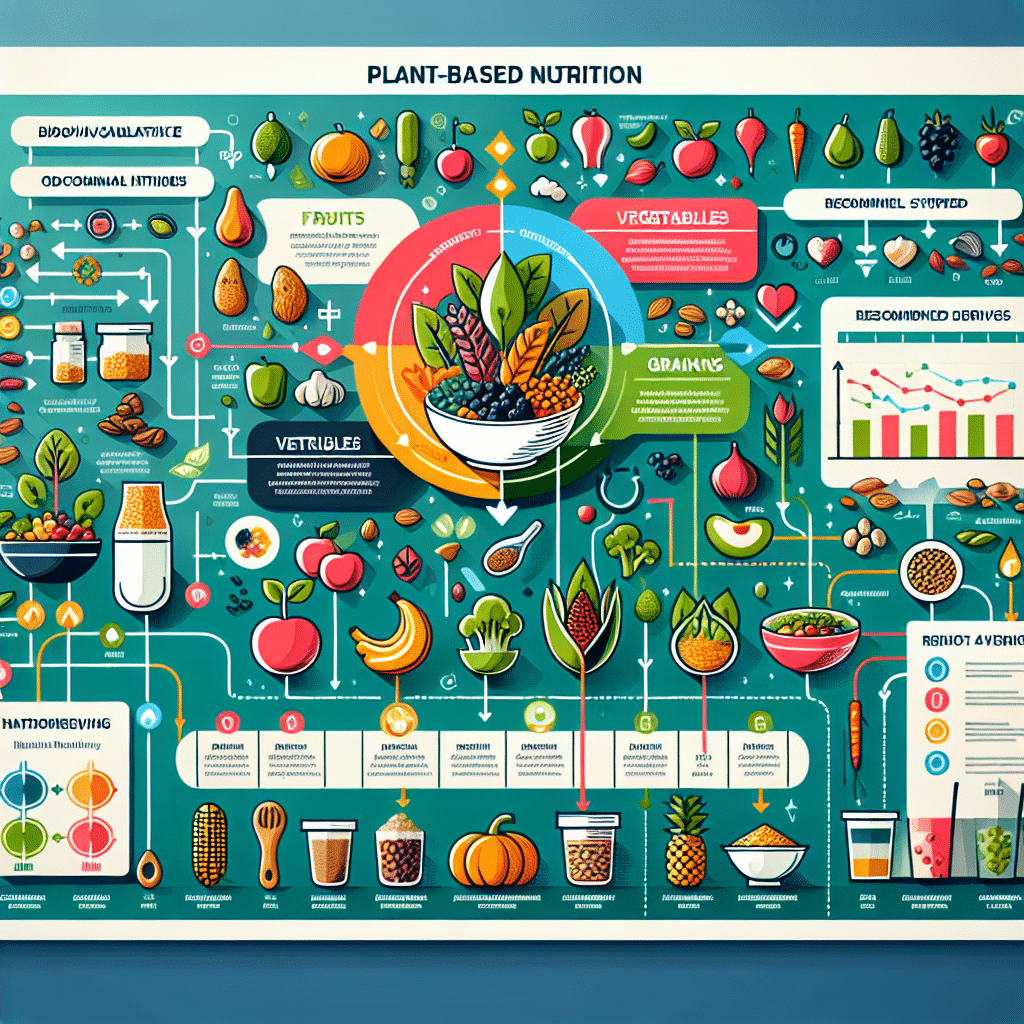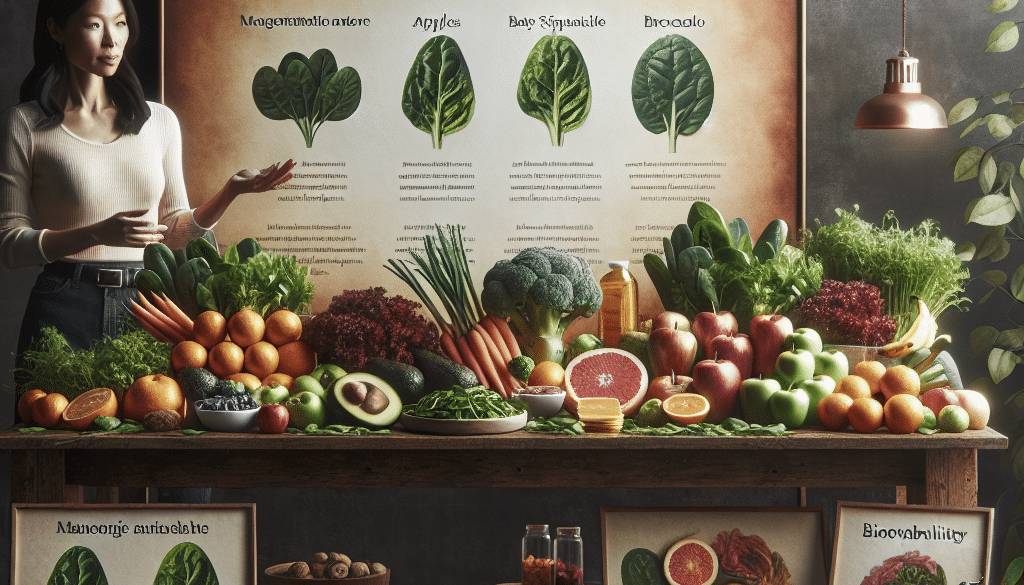Plant-based Nutrition: Managing Intake and Bioavailability
-
Table of Contents
Plant-Based Nutrition: Optimizing Intake and Bioavailability

As the popularity of plant-based diets continues to rise, understanding the management of nutrient intake and bioavailability becomes increasingly important. Plant-based nutrition offers a plethora of health benefits, but it also requires careful planning to ensure that all nutritional needs are met. This article delves into the strategies for optimizing the intake and bioavailability of nutrients from plant-based sources.
Understanding Plant-Based Diets
Plant-based diets are composed predominantly of foods derived from plants, including vegetables, fruits, grains, nuts, seeds, and legumes. While some individuals choose to exclude all animal products, adopting a vegan lifestyle, others may include small amounts of animal-derived foods in their diet. Regardless of the approach, the focus is on consuming a variety of plant foods to provide the body with essential nutrients.
Nutrient Intake on a Plant-Based Diet
One of the primary concerns when adopting a plant-based diet is ensuring adequate intake of certain nutrients that are commonly found in animal products. These include protein, iron, calcium, vitamin B12, omega-3 fatty acids, and vitamin D. Here’s how to manage the intake of these key nutrients:
- Protein: Combine different plant proteins such as legumes, grains, nuts, and seeds throughout the day to ensure a complete amino acid profile.
- Iron: Consume iron-rich plant foods like lentils, chickpeas, tofu, and spinach, and pair them with vitamin C-rich foods to enhance absorption.
- Calcium: Include calcium-fortified plant milks and juices, as well as leafy greens and tofu set with calcium sulfate.
- Vitamin B12: Use B12-fortified foods or take a B12 supplement, as this vitamin is not reliably found in plant foods.
- Omega-3 Fatty Acids: Incorporate flaxseeds, chia seeds, hemp seeds, and walnuts, or consider an algae-based omega-3 supplement.
- Vitamin D: Get regular sun exposure and consume fortified foods or supplements, especially in regions with limited sunlight.
Enhancing Nutrient Bioavailability
Bioavailability refers to the proportion of a nutrient that is absorbed and utilized by the body. Some plant-based foods contain compounds that can inhibit the absorption of nutrients. However, there are methods to enhance bioavailability:
- Soaking and Sprouting: Soaking nuts, seeds, and legumes can reduce phytic acid, which binds minerals and decreases their absorption.
- Fermentation: Fermented plant foods like tempeh and kimchi can improve the digestibility and absorption of nutrients.
- Cooking: Cooking can increase the bioavailability of certain nutrients, such as lycopene in tomatoes and beta-carotene in carrots.
- Food Pairing: Combining certain foods can enhance nutrient absorption, such as pairing iron-rich foods with vitamin C sources.
Case Studies and Statistics
Research has shown that well-planned plant-based diets can provide all the necessary nutrients for optimal health. For example, a study published in the Journal of the Academy of Nutrition and Dietetics found that a vegan diet could meet the recommended daily intake for all nutrients, except for vitamin B12, which should be supplemented.
Statistics from the National Health and Nutrition Examination Survey indicate that individuals following a plant-based diet often have higher intakes of fiber, vitamins A, C, and E, and tend to have lower body mass indexes (BMIs) compared to non-vegetarians.
Conclusion: Key Takeaways for Plant-Based Nutrition
Managing nutrient intake and bioavailability on a plant-based diet is essential for maintaining good health. By focusing on a variety of nutrient-rich plant foods, employing specific preparation and cooking methods, and supplementing when necessary, individuals can thrive on a plant-based diet. The key is to plan and be mindful of the body’s nutritional needs.
ETprotein: Your Partner in Plant-Based Nutrition
If you’re looking to enhance your plant-based diet with high-quality protein sources, ETprotein offers a range of organic bulk vegan proteins that are non-GMO and allergen-free. Their products, including rice protein, pea protein, and various seed proteins, provide excellent options for those seeking to boost their protein intake with plant-based alternatives. Additionally, ETprotein’s L-(+)-Ergothioneine (EGT) supplements can support your overall health and well-being.
About ETprotein:
ETprotein, a reputable protein and L-(+)-Ergothioneine (EGT) Chinese factory manufacturer and supplier, is renowned for producing, stocking, exporting, and delivering the highest quality organic bulk vegan proteins and L-(+)-Ergothioneine. They include Organic rice protein, clear rice protein, pea protein, clear pea protein, watermelon seed protein, pumpkin seed protein, sunflower seed protein, mung bean protein, peanut protein, and L-(+)-Ergothioneine EGT Pharmaceutical grade, L-(+)-Ergothioneine EGT food grade, L-(+)-Ergothioneine EGT cosmetic grade, L-(+)-Ergothioneine EGT reference grade and L-(+)-Ergothioneine EGT standard. Their offerings, characterized by a neutral taste, non-GMO, allergen-free attributes, with L-(+)-Ergothioneine purity over 98%, 99%, cater to a diverse range of industries. They serve nutraceutical, pharmaceutical, cosmeceutical, veterinary, as well as food and beverage finished product distributors, traders, and manufacturers across Europe, USA, Canada, Australia, Thailand, Japan, Korea, Brazil, and Chile, among others.
ETprotein specialization includes exporting and delivering tailor-made protein powder and finished nutritional supplements. Their extensive product range covers sectors like Food and Beverage, Sports Nutrition, Weight Management, Dietary Supplements, Health and Wellness Products, and Infant Formula, ensuring comprehensive solutions to meet all your protein needs.
As a trusted company by leading global food and beverage brands and Fortune 500 companies, ETprotein reinforces China’s reputation in the global arena. For more information or to sample their products, please contact them and email sales(at)ETprotein.com today.












